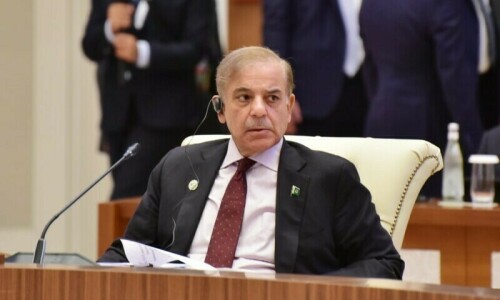ISLAMABAD, Sept 14: The government has decided not to announce a new support price for the next wheat crop till mid-October because of fears that a good package for growers announced in Ramazan may result in an increase in flour price.
Sources in the ministry of food, agriculture and livestock (Minfal) said on Sunday that the government, which was expected to announce the support price later this month, had delayed the decision for at least 20 days.
Fearing a decline in wheat sowing area, the ministry had requested the prime minister to fix a minimum support price of Rs1,000 per 40kgs for the 2008-9 crop in the last weak of September.
It is said that last year’s 20 per cent reduction in wheat sowing area and the inability of the country to achieve the production target were a result of the government’s failure to make an early announcement of an attractive support price for farmers.
Prime Minister Yousuf Raza Gilani, who heads the Economic Coordination Committee (ECC) of the cabinet, was expected to announce the support price this month but there are fears that the move may encourage hoarding.
An official said the government expected an increase of at least Rs100 in the price of a 20kgs bag of flour if the announcement was made in Ramazan. The flour bags are being sold at a subsidised rate of Rs300 in Punjab and Rs600 to Rs700 in Sindh, the NWFP and Balochistan.
Wheat sowing will start in arid areas in October and the ministry believes that the announcement of a support price, not less than the market rate, will attract farmers to the crop and enable the country to achieve the production target of about 24 million tons.
The ministry has informed the ECC that last year’s support price of Rs625 per 40kgs might not be acceptable to farmers and they might not be motivated to sell their crop to the government at half of the market rate.
It has also informed the ECC that the cost of imported wheat had been between Rs1,200 and Rs1,400 per 40kgs over the past six months.
IRANIAN FERTILISER: While the authorities have failed to stop smuggling of wheat to Afghanistan and other neighbouring countries because of a 34 per cent difference in price, an official told Dawn that farmers in Sindh and Balochistan were happy to get quality DAP fertiliser smuggled from Iran.
The official said farmers in lower Sindh were buying Iranian DAP smuggled through Balochistan because it was of good quality and cost almost half of the local fertiliser.
Iranian DAP is available at Rs1,800 per bag, compared with the Rs3,000 price of the Pakistani product. The availability of the Iranian DAP is likely to enable farmers to meet their requirement ahead of the Rabi season.
On the other hand, the farmers are unable to buy locally produced urea fertiliser. The urea price in Pakistan hovers around $180 per ton, while in the neighbouring countries it has touched $800.
The country produces 4.8 million tons of urea, while its requirement is around 5.6 million tons. The gap of 800,000 tons is met through imports.
The government has made arrangements to import 400,000 tons from Iran and over 200,000 tons from Kuwait.













































Dear visitor, the comments section is undergoing an overhaul and will return soon.